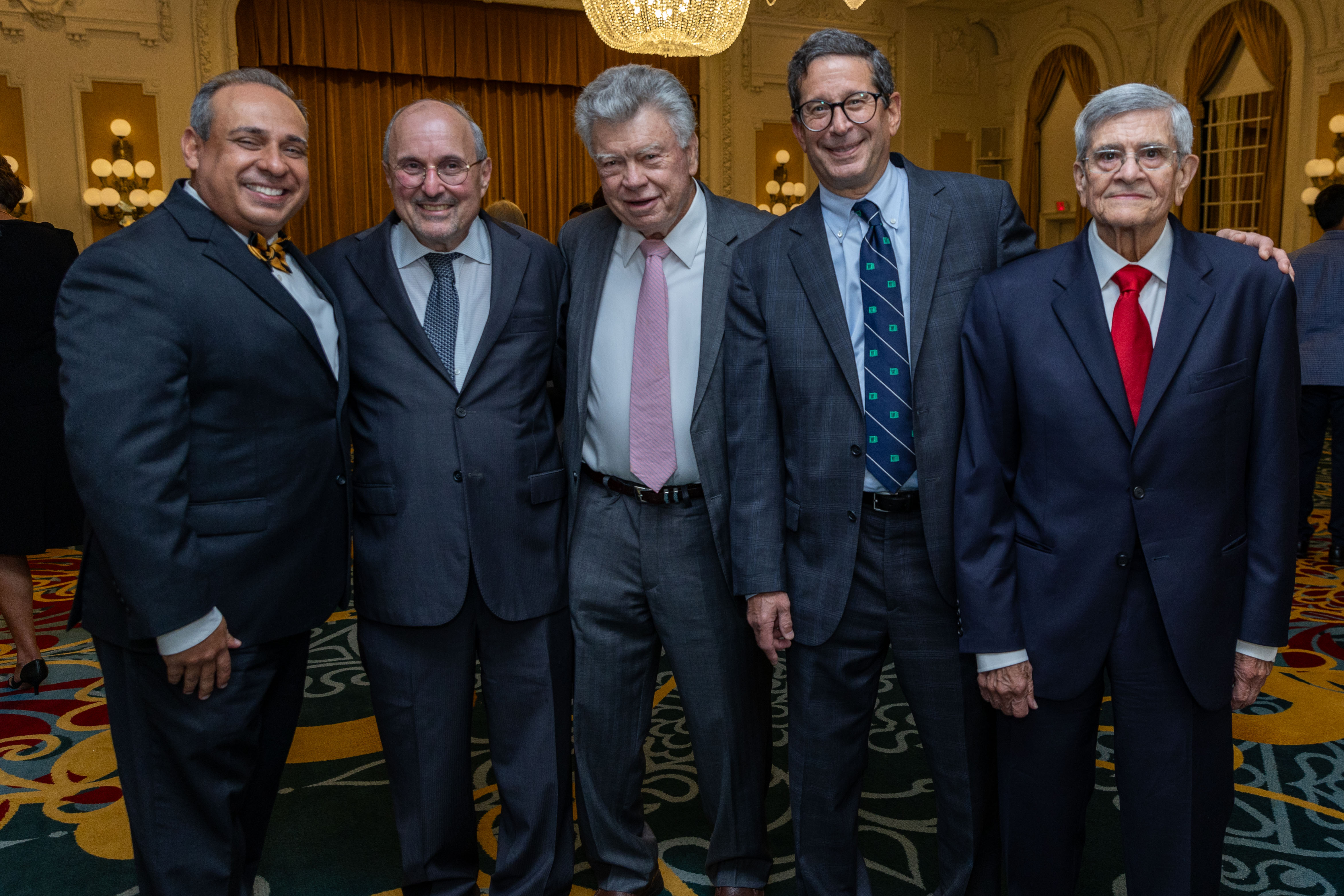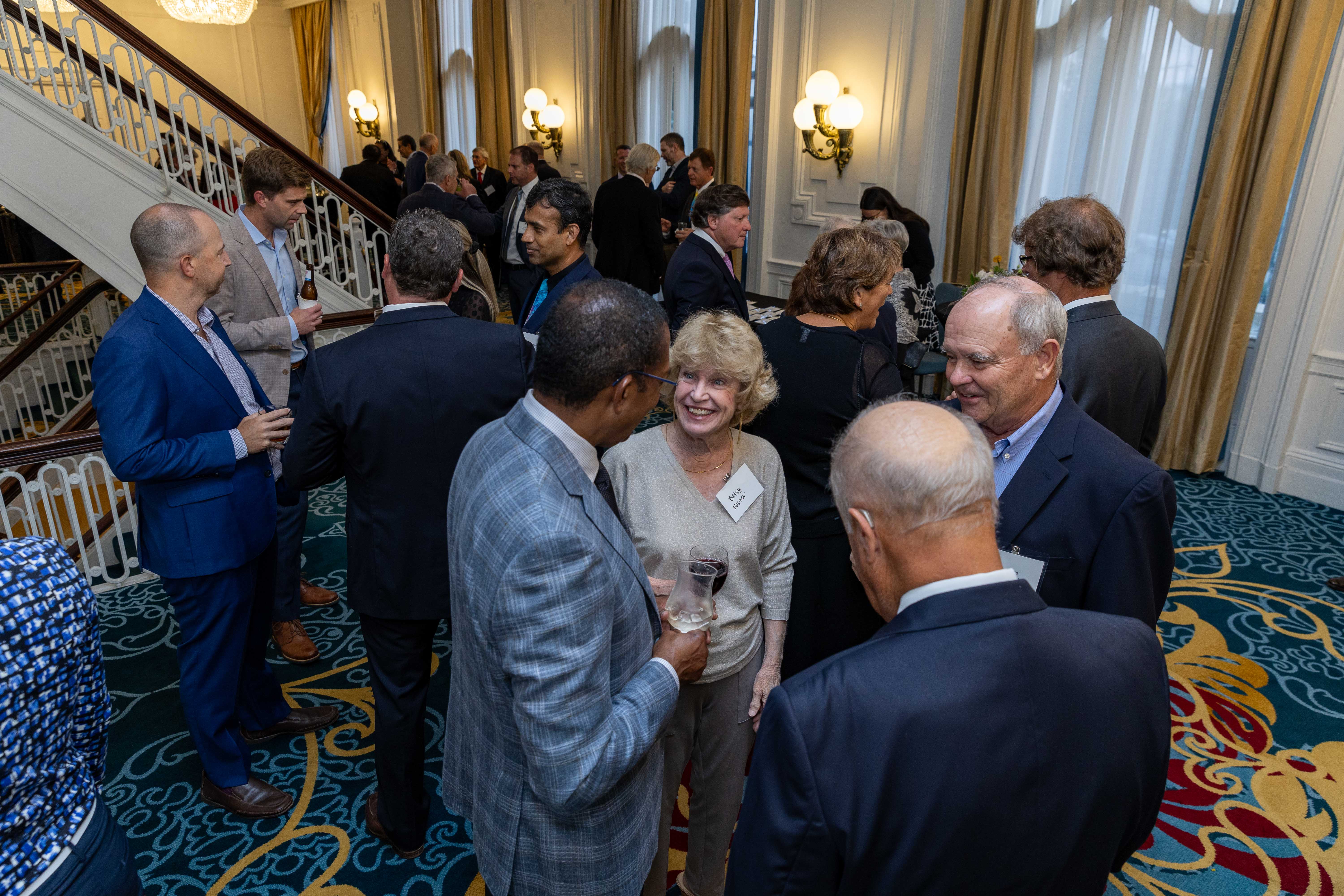Diving for pearls, discovering treasure
Faculty, alumni and trainees from the VCU Department of Orthopaedic Surgery are celebrating three decades of success, and promising days ahead.

Arturo P. Saavedra, M.D., Ph.D., M.B.A., dean of the VCU School of Medicine (far left), and Wilhelm A. Zuelzer, M.D., H’81, the Richard Caspari Professor of Sports Medicine (second from left), are pictured with all three of the chairs who have led the Department of Orthopaedic Surgery through its first 30 years (from right to left): John A. Cardea, M.D., H’73, Stephen Kates, M.D. and, Robert S. Adelaar, M.D. (Photo by Skip Rowland)
The proverb “pearls don’t lie on the seashore” is meant to convey the concept that gaining something special often requires taking a chance.
This year, the VCU Department of Orthopaedic Surgery is celebrating its pearl anniversary, marking 30 years as a standalone department in the School of Medicine.
Since branching off from the Department of Surgery in 1994, orthopaedic medicine on the MCV Campus has grown into a nationally recognized leader in patient care, research and education, and is the only department of orthopaedics in Virginia to be nationally ranked by U.S. News & World Report. In 2023, VCU continued its climb into the No. 33 spot.
To mark the occasion, faculty, alumni and trainees recently gathered in Richmond, Virginia. With some traveling from as far away as the West Coast and Hawaii, they reflected on three decades of success and the momentum that has positioned VCU as a hub for orthopaedic excellence.
 The event included more than 70 faculty, trainees and alumni, with some traveling from as far away as the West Coast and Hawaii. (Photo by Skip Rowland)
The event included more than 70 faculty, trainees and alumni, with some traveling from as far away as the West Coast and Hawaii. (Photo by Skip Rowland) The celebration also provided an opportunity to commemorate the department’s history, share stories and recognize the impact of each of the three faculty members who have led the department as chair.
An inspiration confirmed
In the first two decades of his career, founding chair John A. Cardea, M.D., H’73, witnessed a transformation in the practice of orthopaedic surgery.
What was once a niche discipline focused mainly on the operating room evolved into a dynamic field of medicine experiencing a surge in demand. Cardea says the culture of patient care and teaching excellence he experienced in his early days on the MCV Campus prepared him for the challenge.
“When we started, our main area of strength was training residents to become skilled surgeons,” Cardea says. “Over the past 30 years, our reputation has expanded to include distinction in patient care and research, and a lot of great people with a shared vision of what we could do together have made this possible.”
Among them was Robert S. Adelaar, M.D., who served on the faculty for 25 years before stepping into the role of chair in 2001.
“I feel very fortunate to have continued a lot of what Dr. Cardea started, and philanthropic gifts made so much of that possible,” says Adelaar, who was also the first faculty member to hold the John A. Cardea Endowed Chair, a position established to honor the legacy of his longtime colleague.
“With this support, and through collaboration with leadership in the hospital and School of Medicine, we added a number of specialties like arthroplasty, orthopaedic oncology and our hand surgery division, among many others,” Adelaar says. “We also doubled the size of our faculty, cared for more patients by opening a clinic in South Hill, and our partnership with pediatric colleagues at the Children’s Hospital of Richmond grew as well.”
Like his predecessor, Adelaar fostered and enhanced valuable educational opportunities, including clinical rotations at the Richmond Veterans Affairs Medical Center, where both residents and medical students learn among a population of patients who often require complex care.
Additionally, he placed great importance on expanding the department’s research enterprise, and along with colleague and physician-scientist Wilhelm A. Zuelzer, M.D., H’81, is co-namesake to the Adelaar-Zuelzer Orthopedics Resident Research Fund.
The pilot grant program invests in residents’ early-stage research and has served as the proving ground for some of the most promising ideas to come out of the department. One example is Nerve Tape, invented by Jonathan E. Isaacs, M’96, H’01, chair of the Division of Hand Surgery. The groundbreaking device recently earned Food and Drug Administration clearance and has the potential to transform nerve repair techniques.
Since the arrival of Stephen Kates, M.D., as chair in 2015, orthopaedics has continued to flourish, with an elevated emphasis on research, optimizing training opportunities and serving more communities throughout the region. The department now serves patients in 10 hospitals throughout central Virginia, including recent expansions in Williamsburg, Fredericksburg and Tappahannock.
An internationally-recognized leader whose approach to geriatric fracture care is emulated by hospitals around the world, Kates is currently principal investigator on the only NIH Center of Translational Research P50 grant in orthopaedic surgery in the nation.
While his investigations and clinical insights are making waves globally, his dedication to mentorship is having an impact locally.
“When I arrived, I was impressed with Dr. Isaacs' early work and invested the resources he needed to compete for external funding,” says Kates, who holds the James W. and Frances G. McGlothlin Chair of Orthopaedics. “Today his homegrown idea is a patented technology that is receiving a significant grant from the Department of Defense.
“The resident research infrastructure that Dr. Adelaar helped establish is a big part of this success story,” says Kates, noting that research efforts in the department have also answered critical questions in other areas like total knee replacement technology and the relationship between sepsis and multi-organ failure.
To further bolster this culture of innovation and discovery, an anonymous donor established the Stephen L. Kates, M.D., Orthopaedic Research Fund to support residents and faculty in the department.
Kates applies his process-improvement mindset to fine-tune the educational experience as well. The real-time feedback protocols that he’s implemented for trainees and attending physicians advance both the department's clinical capabilities and inspire a new generation dedicated to improving patient outcomes – an inspiration Kates says is confirmed by the number of trainees choosing to join the faculty after residency.
Honoring the past. Anticipating the future. Celebrating the moment.
With a highly-skilled, committed faculty roster, Kates is optimistic about the days and years ahead – though he isn’t missing the chance to fully appreciate the current moment.
“As surgeons, we spend a lot of time in the present, but we don’t often take time to celebrate all of the good things that have happened, and to think about where we’re going in the future,” Kates says. “Dr. Cardea had the foresight to begin building this department, and over 30 years a significant number of people have helped us become a truly great program without sacrificing our core values.”
To make a gift in support of the Department of Orthopaedic Surgery, please contact Andrew Hartley, senior director of development, at aphartle@vcu.edu, or make a gift online:
- John A. Cardea Chair in Orthopaedic Surgery
- Adelaar-Zuelzer Orthopaedic Resident Research Fund
- Stephen L. Kates Orthopaedic Research Fund

